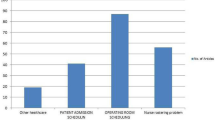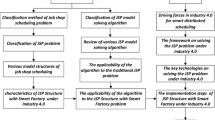Abstract
The issue of write-read contention is one of the most prevalent problems when deploying real-time data warehouses. With increasing load, updates are increasingly delayed and previously fast queries tend to be slowed down considerably. However, depending on the user requirements, we can improve the response time or the data quality by scheduling the queries and updates appropriately. If both criteria are to be considered simultaneously, we are faced with a so-called multi-objective optimization problem. We transformed this problem into a knapsack problem with additional inequalities and solved it efficiently. Based on our solution, we developed a scheduling approach that provides the optimal schedule with regard to the user requirements at any given point in time. We evaluated our scheduling in an extensive experimental study, where we compared our approach with the respective optimal schedule policies of each single optimization objective.
Similar content being viewed by others
References
Branke J, Saliho~glu E, Uyar Ş (2005) Towards an analysis of dynamic environments. In: GECCO, ACM, New York, NY, USA, pp 1433–1440
Braumandl R, Kemper A, Kossmann D (2003) Quality of service in an information economy. ACM Trans Interet Technol 3(4):291–333
Davison DL, Graefe G (1995) Dynamic resource brokering for multi-user query execution. SIGMOD Rec 24(2):281–292
Dellaert BGC, Kahn BE (1999) How tolerable is delay? consumers evaluations of internet web sites after waiting. J Interact Market 13:41–54
Francalanci C, Pernici B (2004) Data quality assessment from the user’s perspective. In: IQIS, ACM, New York, NY, USA, pp 68–73, doi: http://doi.acm.org/10.1145/1012453.1012465
Garey MR, Johnson DS (1979) Computers and Intractability: A Guide to the Theory of NP-Completeness. W.H. Freeman, New York, NY
Haritsa JR, Carey MJ, Livny M (1993) Value-Based Scheduling in Real-Time Database Systems. VLDB J 2(2):117–152
Hong D, Johnson T, Chakravarthy S (1993) Real-time transaction scheduling: A cost conscious approach. In: Proceedings of the 1993 ACM SIGMOD international conference on Management of data, May 25–28, 1993, Washington, D.C., pp 197–206
Hughes EJ (2005) Evolutionary many-objective optimisation: many once or one many? In: Congress on Evolutionary Computation, Institute of Electrical and Electronics Engineers (IEEE), March, 2008, Witten-Bommerholz, pp 222–227
Kang KD (2004) Managing deadline miss ratio and sensor data freshness in real-time databases. TKDE 16(10):1200–1216, senior member Sang H. Son and fellow John A. Stankovic
Kang KD, Son SH, Stankovic JA, Abdelzaher TF (2002) A qos-sensitive approach for timeliness and freshness guarantees in real-time databases. In: ECRTS, pp 203–212
Karp RM (1972) Reducibility among combinatorial problems. In: Complexity of Computer Computations. Plenum, New York
Krompass S, Dayal U, Kuno HA, Kemper A (2007) Dynamic workload management for very large data warehouses: Juggling feathers and bowling balls. In: VLDB, pp 1105–1115
Leung J, Kelly L, Anderson JH (2004) Handbook of Scheduling: Algorithms, Models, and Performance Analysis. CRC Press, Inc., Boca Raton, FL, USA
Motro A, Rakov I (1996) Estimating the quality of data in relational databases. In: In Proceedings of the 1996 Conference on Information Quality, MIT, pp 94–106
Nauss RM (1978) The 0-1 knapsack problem with multiple choice constraints. Eur J Oper Res 2(2):125–131
Nemhauser G, Ullmann Z (1969) Discrete dynamic programming and capital allocation. Manag Sci 15:494–505
Schrage LE (1968) A proof of the optimality of the shortest remaining processing time discipline. Oper Res 16:678–690
Schrage LE, Miller LW (1966) The queue m/g/1 with the shortest remaining processing time discipline. Oper Res 14:670–684
Schroeder B, Harchol-Balter M, Iyengar A, Nahum E (2006) Achieving class-based qos for transactional workloads. In: ICDE, IEEE Computer Society, Washington, DC, USA, p 153
Smith WE (1956) Various optimizers for single-stage production. Naval Res Logist Quart 3:59–66
Stonebraker M, Aoki PM, Litwin W, Pfeffer A, Sah A, Sidell J, Staelin C, Yu A (1996) Mariposa: a wide-area distributed database system. The VLDB J 5(1):048–063
Thiele M, Fischer U, Lehner W (2007) Partition-based workload scheduling in living data warehouse environments. In: DOLAP, ACM, New York, NY, USA, pp 57–64
Thiele M, Fischer U, Lehner W (2008) Partition-based workload scheduling in living data warehouse environments. Inform Syst 34:1–5
Thomsen C, Pedersen TB, Lehner W (2008) Rite: Providing on-demand data for right-time data warehousing. In: ICDE, pp 456–465
T’Kindt V, Billaut JC (2006) Multicriteria Scheduling – Theory, Models and Algorithms. Springer Verlag, Berlin
Toth P (1980) Dynamic programming algorithms for the zero-one knapsack problem. Computing 25:29–45
Vassiliadis P, Bouzeghoub M, Quix C (1999) Towards quality-oriented data warehouse usage and evolution. In: CAiSE, Springer, Heidelberg, pp 164–179
Weikum G (1999) Towards guaranteed quality and dependability of information systems. In: Proceedings of the Conference Datenbanksysteme in Buro, Technik und Wissenschaft, Springer Verlag, pp 379–409
Zhou M, Zhou L (1996) How does waiting duration information influence customers’ reactions to waiting for services. J Appl Soc Psychol 26:1702–1717
Author information
Authors and Affiliations
Corresponding author
Rights and permissions
About this article
Cite this article
Thiele, M., Bader, A. & Lehner, W. Multi-objective scheduling for real-time data warehouses . Comp. Sci. Res. Dev. 24, 137–151 (2009). https://doi.org/10.1007/s00450-009-0062-z
Received:
Revised:
Published:
Issue Date:
DOI: https://doi.org/10.1007/s00450-009-0062-z




